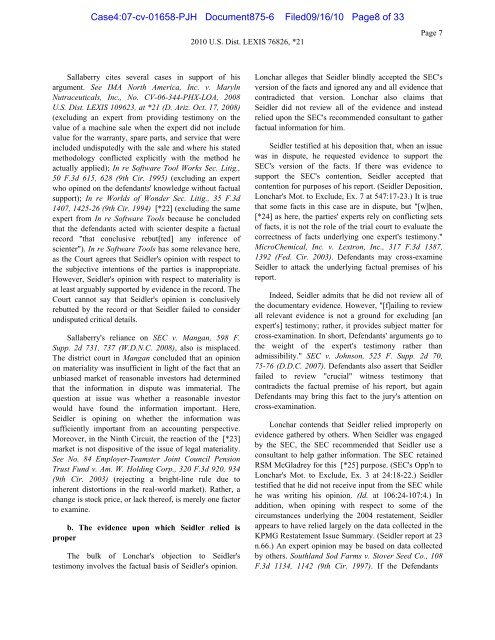exhibit 2 - SAP Lawsuit Portal
exhibit 2 - SAP Lawsuit Portal
exhibit 2 - SAP Lawsuit Portal
Create successful ePaper yourself
Turn your PDF publications into a flip-book with our unique Google optimized e-Paper software.
Case4:07-cv-01658-PJH Document875-6 Filed09/16/10 Page8 of 33<br />
Sallaberry cites several cases in support of his<br />
argument. See IMA North America, Inc. v. Maryln<br />
Nutraceuticals, Inc., No. CV-06-344-PHX-LOA, 2008<br />
U.S. Dist. LEXIS 109623, at *21 (D. Ariz. Oct. 17, 2008)<br />
(excluding an expert from providing testimony on the<br />
value of a machine sale when the expert did not include<br />
value for the warranty, spare parts, and service that were<br />
included undisputedly with the sale and where his stated<br />
methodology conflicted explicitly with the method he<br />
actually applied); In re Software Tool Works Sec. Litig.,<br />
50 F.3d 615, 628 (9th Cir. 1995) (excluding an expert<br />
who opined on the defendants' knowledge without factual<br />
support); In re Worlds of Wonder Sec. Litig., 35 F.3d<br />
1407, 1425-26 (9th Cir. 1994) [*22] (excluding the same<br />
expert from In re Software Tools because he concluded<br />
that the defendants acted with scienter despite a factual<br />
record "that conclusive rebut[ted] any inference of<br />
scienter"). In re Software Tools has some relevance here,<br />
as the Court agrees that Seidler's opinion with respect to<br />
the subjective intentions of the parties is inappropriate.<br />
However, Seidler's opinion with respect to materiality is<br />
at least arguably supported by evidence in the record. The<br />
Court cannot say that Seidler's opinion is conclusively<br />
rebutted by the record or that Seidler failed to consider<br />
undisputed critical details.<br />
Sallaberry's reliance on SEC v. Mangan, 598 F.<br />
Supp. 2d 731, 737 (W.D.N.C. 2008), also is misplaced.<br />
The district court in Mangan concluded that an opinion<br />
on materiality was insufficient in light of the fact that an<br />
unbiased market of reasonable investors had determined<br />
that the information in dispute was immaterial. The<br />
question at issue was whether a reasonable investor<br />
would have found the information important. Here,<br />
Seidler is opining on whether the information was<br />
sufficiently important from an accounting perspective.<br />
Moreover, in the Ninth Circuit, the reaction of the [*23]<br />
market is not dispositive of the issue of legal materiality.<br />
See No. 84 Employer-Teamster Joint Council Pension<br />
Trust Fund v. Am. W. Holding Corp., 320 F.3d 920, 934<br />
(9th Cir. 2003) (rejecting a bright-line rule due to<br />
inherent distortions in the real-world market). Rather, a<br />
change is stock price, or lack thereof, is merely one factor<br />
to examine.<br />
b. The evidence upon which Seidler relied is<br />
proper<br />
The bulk of Lonchar's objection to Seidler's<br />
testimony involves the factual basis of Seidler's opinion.<br />
2010 U.S. Dist. LEXIS 76826, *21<br />
Page 7<br />
Lonchar alleges that Seidler blindly accepted the SEC's<br />
version of the facts and ignored any and all evidence that<br />
contradicted that version. Lonchar also claims that<br />
Seidler did not review all of the evidence and instead<br />
relied upon the SEC's recommended consultant to gather<br />
factual information for him.<br />
Seidler testified at his deposition that, when an issue<br />
was in dispute, he requested evidence to support the<br />
SEC's version of the facts. If there was evidence to<br />
support the SEC's contention, Seidler accepted that<br />
contention for purposes of his report. (Seidler Deposition,<br />
Lonchar's Mot. to Exclude, Ex. 7 at 547:17-23.) It is true<br />
that some facts in this case are in dispute, but "[w]hen,<br />
[*24] as here, the parties' experts rely on conflicting sets<br />
of facts, it is not the role of the trial court to evaluate the<br />
correctness of facts underlying one expert's testimony."<br />
MicroChemical, Inc. v. Lextron, Inc., 317 F.3d 1387,<br />
1392 (Fed. Cir. 2003). Defendants may cross-examine<br />
Seidler to attack the underlying factual premises of his<br />
report.<br />
Indeed, Seidler admits that he did not review all of<br />
the documentary evidence. However, "[f]ailing to review<br />
all relevant evidence is not a ground for excluding [an<br />
expert's] testimony; rather, it provides subject matter for<br />
cross-examination. In short, Defendants' arguments go to<br />
the weight of the expert's testimony rather than<br />
admissibility." SEC v. Johnson, 525 F. Supp. 2d 70,<br />
75-76 (D.D.C. 2007). Defendants also assert that Seidler<br />
failed to review "crucial" witness testimony that<br />
contradicts the factual premise of his report, but again<br />
Defendants may bring this fact to the jury's attention on<br />
cross-examination.<br />
Lonchar contends that Seidler relied improperly on<br />
evidence gathered by others. When Seidler was engaged<br />
by the SEC, the SEC recommended that Seidler use a<br />
consultant to help gather information. The SEC retained<br />
RSM McGladrey for this [*25] purpose. (SEC's Opp'n to<br />
Lonchar's Mot. to Exclude, Ex. 3 at 24:18-22.) Seidler<br />
testified that he did not receive input from the SEC while<br />
he was writing his opinion. (Id. at 106:24-107:4.) In<br />
addition, when opining with respect to some of the<br />
circumstances underlying the 2004 restatement, Seidler<br />
appears to have relied largely on the data collected in the<br />
KPMG Restatement Issue Summary. (Seidler report at 23<br />
n.66.) An expert opinion may be based on data collected<br />
by others. Southland Sod Farms v. Stover Seed Co., 108<br />
F.3d 1134, 1142 (9th Cir. 1997). If the Defendants


